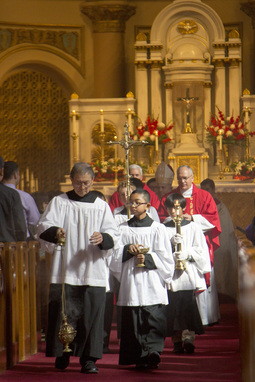 Christ’s victory procession in San Francisco
Christ’s victory procession in San Francisco I made up a nice little Advent quiz for all of you today—just three questions.
Question One: Tomorrow is a “holy day of _________.”
Question Two: Tomorrow, December 8, is the Feast of the ____________.
Question Three: The Immaculate Conception refers to whom?
The White Dawn
Why does the Solemnity of the Immaculate Conception occur in the middle of Advent? Because Mary’s Immaculate Conception was the prelude to the Incarnation, the necessary preparation for the baby Jesus. It was fitting that God first prepare an immaculate mother for His Son by preserving her body and soul from the decay of original sin. Mary is the “white dawn” that announces the rising of God’s Son. Have you ever passed a very bad night, longing for that first bit of light in the eastern sky? The dawn assures us that the night will not last forever. So in Isaiah Chapter 40, the “Book of Consolation” is written for a people in their 40th year of exile, two generations in Babylonian slavery for their infidelities. “Comfort, give comfort to my people,” says Yahweh. “Speak tenderly to Jerusalem—her service (slavery) is at an end, her guilt expiated.” Indeed, she has paid double for her sins. It had seemed an endless exile, but Isaiah announces that God and man are now reconciled. “Cry out at the top of your voice these glad tidings: like a shepherd our God feeds and carries his people.”
Glad Tidings
The first words of Mark’s Gospel brings us these glad tidings: “The beginning of the gospel of Jesus Christ, the Son of God.” In this first Gospel to be written, St. Mark is announcing something absolutely new. As Fr. Barron points out in his homily this week, the word “gospel” (in Greek “eu-angelion”) was the “good message” that the emperor would send ahead of him announcing a great military victory. Days before the people would see the emperor marching into Rome at the head of his victory parade, they would hear the heralds or “evangelists” galloping into the city, flags flying: “the emperor has won the victory! We are saved from the enemy!” In fact, one of the emperor’s titles was son of God, but Mark names Jesus Christ the “Son of God.” He is saying that no imperial victory, no good news, can compare with this good news, because Jesus is one and only Son of God and lover of men. These glad tidings are of a whole different order; they address the fundamental problem with our humanity. They grant true freedom.
Prepare
Advent is our annual retreat, our preparation for this king. He has won the victory, and He is on his way to enter San Francisco in triumph (He does that, actually, at every Mass in every Catholic church in this city). His heralds arrive ahead of him, and in today’s gospel it is not only St. Mark, but St. John the Baptist as well. “One mightier than I is coming…he will baptize you with fire,” So make straight his paths—fill up what is lacking in your hearts, and excavate what is burdensome in your bodies.
How to prepare? If all we do before Christmas this year is shop and eat, we will not be ready for such a King. Advent is a time of greater prayer and some measure of fasting, so let’s get at it. Here are three suggestions:
- Pray the rosary once a week, with a view to praying it every day, as Our Lady at Fatima requested. Most Catholics use rosaries as rear view mirror ornaments, but let every Mass-going Catholic in this parish pray the rosary at least once a week. Advent 2014 is a good time to start.
- Go to confession once a month. The people came to John “acknowledging their sins.” Let us do the same to prepare a heart fit for God’s Advent.
- Make a significant gift to someone poorer than you. Christmas is meaningless unless we give sacrificially from our hearts. We need to feel the gift. Money is always nice, and we all know people who have less than we do. Time is good too—a listening ear, a heartfelt letter.
Christmas—that is, Christ’s Mass—is near. I’m sure you all go to Mass on December 25. Please don’t go unprepared: Christmas comes only once a year.


 RSS Feed
RSS Feed